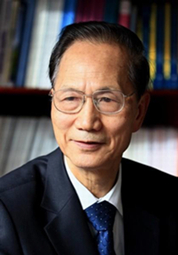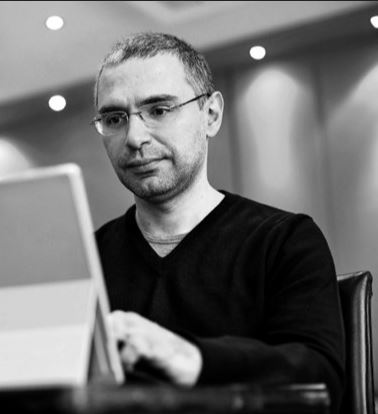Keynote1:Knowledge and Artificial Intelligence
Academician Bo Zhang(Tsinghua University)

Bio: Bo Zhang, an expert in computer science and technology for cymbals and a professor of computer science and technology, Tsinghua University. He has been the deputy director of the school degree committee of Tsinghua University, director of the National Laboratory of Intelligent Technology and System, and director of the Intelligent Control Committee of the Chinese Association of Automation .In 1995, he was elected as the academician of the Chinese Academy of Sciences and was elected honorary doctor of natural sciences of University of Hamburg in Germany in 2011. In 2015, he won the CCF lifetime achievement award of the Chinese Computer Federation in 2014. In 2016, he won the outstanding cooperation contribution award of the Microsoft Research Institute. Zhang has been engaged in the teaching and research of automatic control theory and technology, computer science and technology for a long time. He began his research on artificial intelligence in 1978 and he is one of the earliest researchers in the field.He is one of the founders of the National Laboratory of Intelligent Technology and Systems. Zhang Bo has a solid foundation in theoretical research, and has published more than 200 papers and 4 Monographs. He guided and participated in the research platform of land autonomous vehicle, image and video retrieval. In recent years, the team led by Professor Zhang has conducted in-depth studies on deep learning and large-scale probabilistic modeling and the application of visual information processing, and published dozens of high quality papers. His research achievements have won ICL European Artificial Intelligence Award, National Natural Science(3rd-class), National Education Committee Scientific and Technological Progress Award (1st class, 2nd class), and first prize of Natural Science of CCF . Wang Danping Technology Award in Fujian Province and other honors.
Abstract: TBD
Keynote 2:The Semantic Web: Vision, Reality and Revision
Professor James A. Hendler(Rensselaer Polytechnic Institute)

Bio: Jim Hendler is the Director of the Institute for Data Exploration and Applications (IDEA) and the Tetherless World Professor of Computer, Web and Cognitive Sciences at Rensselaer Polytechnic Institute (RPI). He also heads the RPI-IBM Center for Health Empowerment by Analytics, Learning and Semantics (HEALS) and serves as the Chair of the Board of the UK’s charitable Web Science Trust. Hendler has authored over 400 books, technical papers and articles in the area of Artificial Intelligence including Semantic Web, agent-based computing and high performance AI processing. One of the originators of the “Semantic Web,” Hendler was the recipient of a 1995 Fulbright Foundation Fellowship, is a former member of the US Air Force Science Advisory Board, and is a Fellow of the AAAI, BCS, the IEEE, the AAAS and the ACM. Hendler was the first computer scientist to serve on the Board of Reviewing editors for Science(2004-2016). In 2010, Hendler was named one of the 20 most innovative professors in America by Playboy magazine and was selected as an “Internet Web Expert” by the US government. In 2012, he was one of the inaugural recipients of the Strata Conference “Big Data” awards for his work on large-scale open government data, and he is an associate editor of the Big Data journal. In 2013, he was appointed as the Open Data Advisor to New York State and in 2015 appointed a member of the US Homeland Security Science and Technology Advisory Committee and in 2016, became a member of the National Academies Board on Research Data and Information. He currently also serves as a senior subject matter expert on AI and government for the US National Academy of Public Administration.
Abstract: In 2001, I joined Web inventor Tim Berners-Lee and our colleague Ora Lassila in writing an article describing a vision for the Semantic Web. The paper, which appeared in Scientific American has been widely cited and led to much work in both academia and industry aimed at adding machine-readable text to the Web. Now, nearly 20 years later, Google reports that machine-readable metadata is found on over 40% of their crawl and linked data is used in many applications around the world. Knowledge graph technology, which also grew from this vision, is now a big business used by major organizations around the world. However, despite this success, much of the original vision of the Semantic Web remains unrealized. In this talk, I discuss what was in the original vision, what has occurred and, most importantly, what still remains to be done if we are truly to recognize the potential of the Semantic Web.
Keynote 3:阿里巴巴生态下的知识引擎
玄难 (阿里巴巴)

Bio: 墙辉(阿里花名:玄难),阿里巴巴集团副总裁。2009年加入阿里巴巴之前有多年电信行业BOSS业务架构和技术架构经验。加入阿里后先后负责过建设汇金平台、聚石塔,阿里通信,淘宝技术部。目前负责阿里核心交易链路业务平台,信息平台,飞猪产品技术和国际化技术建设。
Abstract: 如何利用商业大数据更好地服务消费者和中小企业是阿里巴巴要解决的核心问题之一。淘宝、天猫、1688、AliExpress等多个市场每天产生海量的数据。我们在海量的大数据中获取知识、融合知识,表示知识,从而构建阿里通用知识图谱、商品知识图谱、客服知识图谱等等。基于知识推理与计算技术,使得可解释的推理与深度学习相结合,让知识赋能搜索、智能问答、大促、国际化、新零售等业务。为了更好地定义知识引擎,更好地延展可解释推理能力,阿里巴巴联合学界启动了藏经阁计划,从而未来知识更好地赋能中小企业。
Keynote 4:What can you do with multilingual knowledge graphs? Experiences at Sapienza and Babelscape
Professor Roberto Navigli(Sapienza University of Rome)

Bio: Roberto Navigli is Professor of Computer Science at the Sapienza University of Rome, where he heads the multilingual Natural Language Processing group. He was awarded the Marco Somalvico 2013 AI*IA Prize for the best young researcher in AI. He is one of the few European researchers to have received two prestigious ERC grants in computer science, namely an ERC Starting Grant on multilingual word sense disambiguation (2011-2016) and an ERC Consolidator Grant on multilingual language- and syntax-independent open-text unified representations (2017-2022). He was also a co-PI of a Google Focused Research Award on NLP. In 2015 he received the META prize for groundbreaking work in overcoming language barriers with BabelNet, a project also highlighted in The Guardian and Time magazine, and winner of the Artificial Intelligence Journal prominent paper award 2017. Based on the success of BabelNet and its multilingual disambiguation technology, he co-founded Babelscape, a Sapienza startup company which enables Natural Language Processing in hundreds of languages.
Abstract: Multilinguality is a key feature of today’s Web, and it is this feature that we leverage and exploit in our research work at the Sapienza University of Rome’s Linguistic Computing Laboratory and at Babelscape, a Sapienza startup company focused on multilingual Natural Language Processing. In this talk I am going to overview and showcase research and applications of the BabelNet and WordAtlas technology. I will introduce BabelNet live – the largest, continuously-updated multilingual encyclopedic dictionary – and then discuss a range of cutting-edge research and industrial use cases, including: multilingual interpretation of terms, multilingual disambiguation and entity linking, multilingual concept and entity extraction from text.
